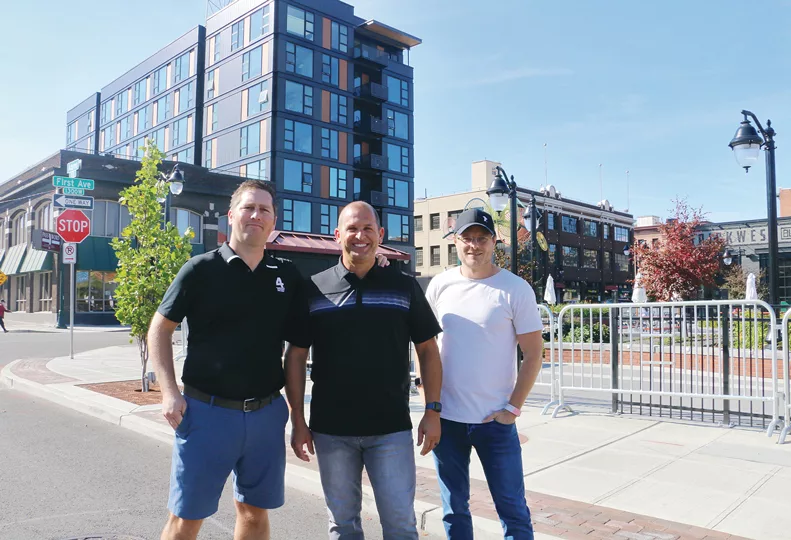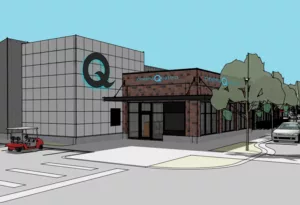
Home » Developer sees future in hybrid housing model
Developer sees future in hybrid housing model
Team looks to mix short-stay, long-term rentals at new Spokane projects

October 8, 2020
A Spokane developer plans to create a mixture of short- and long-term rental units in a building close to Providence Sacred Heart Medical Center, on Spokane’s South Hill.
Project owner Scott Isaak is working with Spokane real estate developer Jordan Tampien and architect Evan Verduin, of Spokane-based Trek Architecture, to create 23 units at 44 W. 6th Ave., about a block south of Providence Sacred Heart Children’s Hospital. On planning documents filed with the city, the project is called 6th and Browne Apartments, but Isaak says he’ll likely land on a different name.
Isaak bought the property through his company 5D Holdings LLC about a year ago, according to Spokane County assessor’s records.
Isaak, who also owns Parkview West Apartments in downtown Spokane, says he’s not sure how many of the units will be dedicated to short-term rentals through platforms such as Airbnb, but he’s set on creating a mix of long- and short-term rental units.
“We had seen the potential for this all along,” Isaak says. “When you run the option in football, you have many potential ways to be successful. In our platform, we view our buildings the same way.”
Isaak, who is based in Chelan, Washington, says he’s already experienced success in the hybrid model. Parkview West has 15 short-term lease units, which Tampien says have hovered at around 80% occupancy over the last few months.
Tampien is acting as project lead on the 6th Ave. project, as he did on development of Parkview West.
“It’s playing off the continued growth Spokane is experiencing and offering that middle segment between a hotel and long-term apartment housing, with a higher-end option,” Tampien says.
He says most of the units will have two bedrooms, with some one-bedroom and studio units. The building is currently occupied by Providence Sacred Heart’s medical resource center, which plans to vacate the building in early 2021. Interior demolition will begin shortly thereafter. Tampien says the building will be fully gutted and remodeled, a process that will take about a year to complete at a cost of about $3 million.
In addition to 23 residential units, the building will have 42 parking stalls and a rooftop terrace, as well as either an exercise room or a room dedicated to hosting Zoom virtual meetings. Isaak says it depends on what the nature of remote work looks like in 2021.
Isaak says he envisions the units attracting health care workers, corporate travelers, and people who intend to find long-term housing in Spokane. The building is in a prime location, he says.
“It’s the best dirt that I own in Spokane, period, from a sheer location standpoint,” Isaak says. “My family has a long-running history of heart disease. My dad passed away in his early 40s, so I’m well aware of the Providence Heart Institute. I’ve looked out to the north through the top window at the heart institute many times, and you’re a stone’s throw away.”
Short-term lease units will be rented out through about 50 different platforms, Isaak says, including Airbnb, VRBO, HomeAway, Expedia, and others.
The hybrid long- and short-term lease model is growing in popularity in Spokane, Tampien says. He knows of three similar projects others in Spokane that are in the early stages of development. Tampien has two hybrid model projects of his own in the works.
As the Journal previously reported, Tampien plans to remodel the five-story building at 120 N. Wall into 21 residential units for long- and short-term leasing.
Tampien says he’s also going with the hybrid model for 1229 W. First, a project Tampien has named the LoLo Lofts. Five of 11 loft-style units will be rented out on a short-term basis, Tampien says.
Verduin and Trek Architecture are also providing design services for the LoLo Lofts project, according to planning documents filed with the city.
Tampien says the model works well because income from long-term rentals is more reliable than that of short-term rental units. He says the hybrid approach could continue to grow in the Spokane market, especially because Spokane-based short-term rental company Stay Alfred closed permanently in May.
“There was somewhat of a vacuum created when Stay Alfred stopped offering the ones at the M,” Tampien says. “They had set the tone for what the market needed to look like.”
Tampien says he’s unsure at what point Spokane could hit market saturation for short-term rentals, partially because it’s unclear how much of demand is attributable to the void left behind by Stay Alfred.
He estimates there were about 24 Stay Alfred units in Spokane when that company closed its doors. Jordan Allen, the former CEO of Stay Alfred, did not immediately respond to a request for comment on Spokane’s short-term rental market.
Tampien says demand for short-term rental units has remained high, as people have continued to travel to Spokane during the pandemic. However, his vision for providing long- and short-term lease units extends beyond the heyday of COVID-19. He expects demand will continue to rise over the next few years.
“What we’re planning for is when the restrictions lift, and things get as close to back to normal as possible,” Tampien says. “Now you have a sports complex that’s open and doing events. You have downtown alive again, office people coming back downtown.”
Meanwhile, Isaak is keeping an eye open for similar project opportunities.
“I’m absolutely certain that there will be more projects in the future,” Isaak says. “I have not identified the next one that is in this exact vein.”
Latest News Special Report Real Estate & Construction
Related Articles




